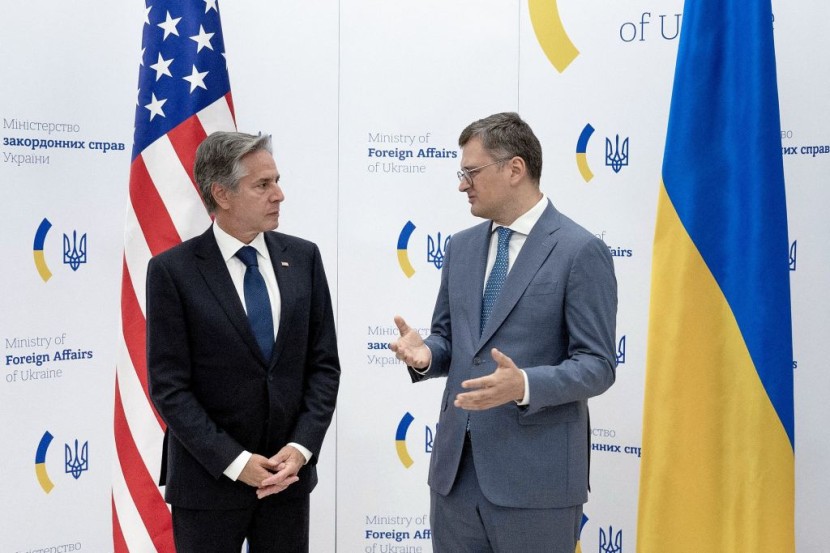
US Secretary of State Antony Blinken made a surprise visit to Kyiv Wednesday (September 6) in a gesture of support for Ukraine as its three-month-old counter-offensive against Russian forces continues with little results.
It is likely Blinken would announce a new package of US wartime assistance to Kyiv worth over $1 billion, a senior State Department official told reporters flying en route to Ukraine. He is also the first top US official to visit Kyiv since the start of the counter-offensive in early June.
Blinken Meets Ukrainian Counterpart, Plans to Meet Zelensky Also on Schedule
In the first of his two-day trip to the war-torn country, Blinken met with Ukrainian Foreign Minister Dmytro Kuleba to begin talks about the new deals. He was also scheduled to meet President Volodymyr Zelensky, the source official added.
"We want to make sure that Ukraine has what it needs, not only to succeed in the counteroffensive but has what it needs for the long term, to make sure that it has a strong deterrent," Blinken told reporters while standing alongside Kuleba. "We're also determined to continue to work with our partners as they build and rebuild a strong economy, strong democracy."
Blinken's Visit a Show of Washington's Moral, Material Support
In recent weeks, media reports have cited unidentified US officials saying the Ukrainian counter-offensive has been too slow, hindered by poor tactics, trenches, and landmines, and might inevitably fail - criticism which angered Ukrainian officials and prompted Kuleba to tell critics to "shut up."
Mere hours before Blinken's visit, Kyiv came under Russian missile attack, but Ukrainian defense officials said they were shot down and did not cause any casualties or damage to the city.
US officials have not publicly criticized Ukraine's military tactics, and last week said they had seen notable Ukrainian progress in the previous 72 hours of its push in the southeast, specifically in the Zaporizhzhia region.
The State Department official also told reporters that Washington wanted to discuss how the counter-offensive was going and assess the battlefield needs and other steps that might be required to shore up Ukraine's energy security before the arrival of winter.
"I think what's most important is that we get a real assessment from the Ukrainians themselves," the official added. "We want to see, and hear how they intend to push forward in the coming weeks."
Meanwhile, the Kremlin's spokesperson Dmitry Peskov reacted to Blinken's visit, saying Moscow believed Washington planned to continue funding Ukraine's military to wage war "to the last Ukrainian." He added Washington's aid to Kyiv would not affect the course of Russia's "special military operation."
On his train ride to Kyiv, Blinken also held talks with Danish Prime Minister Mette Frederiksen, who was also visiting the Ukrainian capital on the same day, thanking him for his country's "leadership in the F-16 coalition of partner nations to train Ukrainian pilots, and for its decision to donate F-16 jets to Ukraine," as mentioned by State Department spokesperson Matthew Miller.
Both Denmark and the Netherlands announced last month they would supply the Ukrainians with their F-16s as they upgrade to the F-35 multi-role stealth fighter jets. Aside from its approval to let nations hot-swap their F-16s into the Ukrainian Air Force, the US also offered to train Ukrainian pilots how to fly the venerable fighter jet.
Losing the Home Front
However, with the 2024 election season in full swing, several Republican presidential candidates questioned the Democrat Biden administration's aid to the Ukrainians, fueling concerns about whether Washington would still support the country at the same level once the election campaign intensifies.
So far, the US government has provided $43 billion in weaponry and other military aid to Ukraine, with a new package of security assistance set to be announced this week.
US President Joe Biden has since asked Congress in August to approve an additional $40 billion in spending, $24 billion of which would go to Ukraine and other international needs. However, the request could face opposition in Congress, particularly from the GOP-majority House, where some far-right Republicans - especially those associated with former president Donald Trump - want to cut Washington's spending to aid Ukraine.
© 2026 HNGN, All rights reserved. Do not reproduce without permission.








